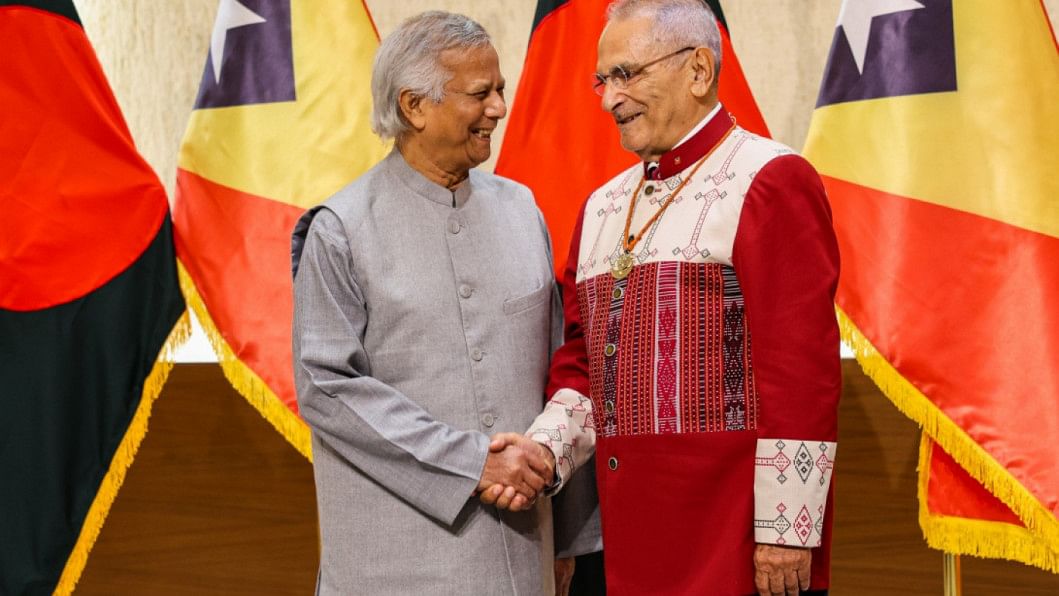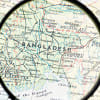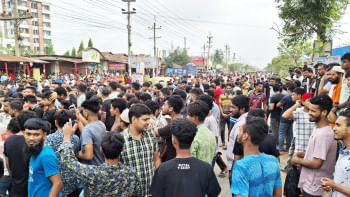The strategic significance of José Ramos-Horta’s Bangladesh visit

In the ever-evolving geopolitical landscape of Southeast Asia and the Bay of Bengal, few diplomatic visits stir as much intrigue and potential as the recent four-day visit of Timor-Leste's President José Ramos-Horta to Bangladesh. Arriving as the only foreign guest invited to celebrate Bangladesh's Victory Day, President Ramos-Horta's visit has ignited discussions that extend far beyond the ceremonial and symbolic. Why was Timor-Leste, a country with a population barely exceeding 1.3 million and a GDP far smaller than Bangladesh's, granted such a warm welcome? Why did Dr Muhammad Yunus, the Nobel laureate and the chief adviser of the interim government of Bangladesh, personally receive the president with a red-carpet reception? What does Timor-Leste's relationship with Bangladesh signify in terms of regional diplomacy, economic partnership, and long-term strategy?
Timor-Leste is no ordinary small nation. Emerging as the first independent country of the 21st century, it symbolises resilience and the struggle for sovereignty. Under the direct supervision of the United Nations, Timor-Leste declared its independence in 2002 after a bloody liberation war, having been under both Portuguese and Indonesian rule for centuries. The young nation is unique, not only because it is a Christian-majority state but also because it emerged from a predominantly Muslim region—separating itself from the world's largest Muslim-majority country, Indonesia. This historical backdrop echoes Bangladesh's own independence struggle, albeit under very different circumstances. But it's more than shared histories that bring these two countries together—it's their respective ambitions to carve out a strong presence in the changing geopolitics of Asia.
The timing of President Ramos-Horta's visit is undeniably significant. Sheikh Hasina, the recently ousted prime minister of Bangladesh, had, in June 2024—two months prior to her removal—made an explosive claim that rattled the political airwaves. She alleged that there was an ongoing plot to carve out a Christian-majority state in South Asia by breaking off parts of Bangladesh's Chittagong Hill Tracts as well as areas in Myanmar. The vision she described was eerily reminiscent of Timor-Leste's trajectory to independence.
The geopolitical calculations surrounding Myanmar complicate matters even further. Myanmar, now embroiled in a civil war, has witnessed rebel groups steadily gaining ground. Reports suggest that the rebels are on the cusp of victory, and with their success, there is growing speculation that they may seek to declare a new independent state in the region. This would have far-reaching implications for neighbouring Bangladesh, already grappling with the presence of over 1.3 million Rohingya refugees displaced by violence in Myanmar. Could these tumultuous events play into the larger narrative that the ousted prime minister spoke of, or is it simply a tempest of political rhetoric?
This brings us to the central question: why Timor-Leste? To answer this, we must delve deeper into Bangladesh's foreign policy trajectory. In the midst of strained relations with Myanmar, Bangladesh has strategically pivoted towards cultivating alliances within Southeast Asia, with a particular focus on ASEAN. In this regard, Malaysia's role has been critical. Prime Minister Anwar Ibrahim, whose country assumed the ASEAN chair this year, has already engaged with Dr Yunus to discuss two pressing issues: pressuring Myanmar to address the Rohingya crisis and accelerating the repatriation process. Malaysia's role as a key player within ASEAN cannot be overstated—it is a nation that has the ear of Myanmar, and its backing could prove pivotal in pushing forward Bangladesh's goals in the region.
Yet, it is Timor-Leste's role as an observer country in ASEAN that makes its relationship with Bangladesh so strategic. While Timor-Leste is not yet a full member of ASEAN, it is expected to join the bloc in the near future. In that capacity, the country could become an influential voice in ASEAN discussions, including on critical issues like the Rohingya crisis. This explains the political importance of President Ramos-Horta's visit: Bangladesh is not simply cultivating ties with a friendly neighbour but aligning itself with a nation poised to take a more prominent role in Southeast Asia's multilateral framework.
Economic ties are another key dimension of this evolving relationship. Timor-Leste's oil and gas reserves, especially in the Timor Sea's Bayu-Undan and Greater Sunrise fields, present an exciting opportunity for collaboration. As global energy markets become increasingly volatile, Bangladesh, which is heavily dependent on energy imports, could find Timor-Leste to be a valuable partner. Joint ventures in energy, including renewable energy and green technologies, were discussed during President Ramos-Horta's visit. These ventures could serve as a foundation for deeper economic cooperation, laying the groundwork for long-term bilateral trade that benefits both nations.
Bangladesh's own economic evolution under the interim leadership of Dr Yunus—who is no stranger to global change-making—also plays a role in shaping this diplomatic direction. Bangladesh's growing strength in fields like microcredit, sustainable development, and social business aligns with Timor-Leste's economic needs. In his discussions with President Ramos-Horta, Dr Yunus offered his microcredit model as a potential tool for combating poverty in Timor-Leste, a country that shares many of Bangladesh's developmental challenges.
The cultural and educational dimensions of the visit are equally compelling. Bangladesh, with its deep expertise in education and healthcare, stands to play a significant role in Timor-Leste's development. Scholarship programmes, cultural exchanges, and joint educational initiatives could help foster long-term collaboration between the two nations. Bangladesh's growing prowess in fields like technology, textiles, and pharmaceuticals also holds the potential to open new markets for Bangladeshi products in Timor-Leste, particularly in industries where Bangladesh has established a competitive edge.
Moreover, Bangladesh's business community has already made substantial inroads into Timor-Leste's market. Bangladeshi entrepreneurs have established a strong presence in Timor-Leste's furniture and electronics industries, sectors essential to the country's economic development. Bangladeshi products, renowned for their affordability and quality, have found a ready market in Timor-Leste, further cementing the ties between the two nations.
The role of Bangladesh's police force in Timor-Leste's fight for independence is another dimension of this bilateral relationship that is often overlooked. During Timor-Leste's struggle for independence in the late 1990s, Bangladesh played an active role in supporting the UN peacekeeping mission, contributing police forces to the operation. Bangladeshi peacekeepers helped stabilise the region and ensured peace and security in the aftermath of the conflict. This history of cooperation between the two nations serves as a foundation for their growing diplomatic and strategic ties today, with both countries recognising the value of working together in the peace and security sector.
Beyond the tangible economic and diplomatic factors lies a larger question: what does this burgeoning relationship signify for Bangladesh's role on the global stage? As global powers shift alliances and recalibrate their strategic priorities, Bangladesh's engagement with Timor-Leste signals an attempt to carve out a unique role in Southeast Asia, a region increasingly defined by its economic dynamism and geopolitical significance. Strengthening ties with Timor-Leste is not just about energy cooperation or trade; it is about positioning Bangladesh as a player in a broader, more diverse network of alliances. Timor-Leste, despite its relatively small size and population, represents a strategic entry point into ASEAN's ever-expanding sphere of influence.
This vision of Bangladesh's future is at the heart of Dr Yunus's diplomatic strategy. By deepening ties with Timor-Leste and other like-minded nations in Southeast Asia, Bangladesh can begin to shape a new narrative—one centred on collaboration, regional solidarity, and sustainable development.
Bangladesh's path forward is fraught with both challenges and opportunities. The visit of President Ramos-Horta marks the beginning of a new chapter in Bangladesh's diplomatic evolution. As a nation with a vision of progress and resilience, Bangladesh is learning to balance regional cooperation with strategic foresight.
As the world turns its gaze towards Southeast Asia, Bangladesh's role as a diplomatic leader—emboldened by the leadership of Dr Yunus and the ongoing support of nations like Timor-Leste—will become increasingly vital. The journey is just beginning, but the destination is clear: Bangladesh is on the path to becoming a key player in a new era of global diplomacy.
Dr Rakib Al Hasan is a physician, author, activist & international award-winning youth leader of Bangladesh. He is the founder and executive director of the Centre for Partnership Initiative. He can be reached at [email protected].
Views expressed in this article are the author's own.
Follow The Daily Star Opinion on Facebook for the latest opinions, commentaries and analyses by experts and professionals. To contribute your article or letter to The Daily Star Opinion, see our guidelines for submission.


 For all latest news, follow The Daily Star's Google News channel.
For all latest news, follow The Daily Star's Google News channel. 









Comments